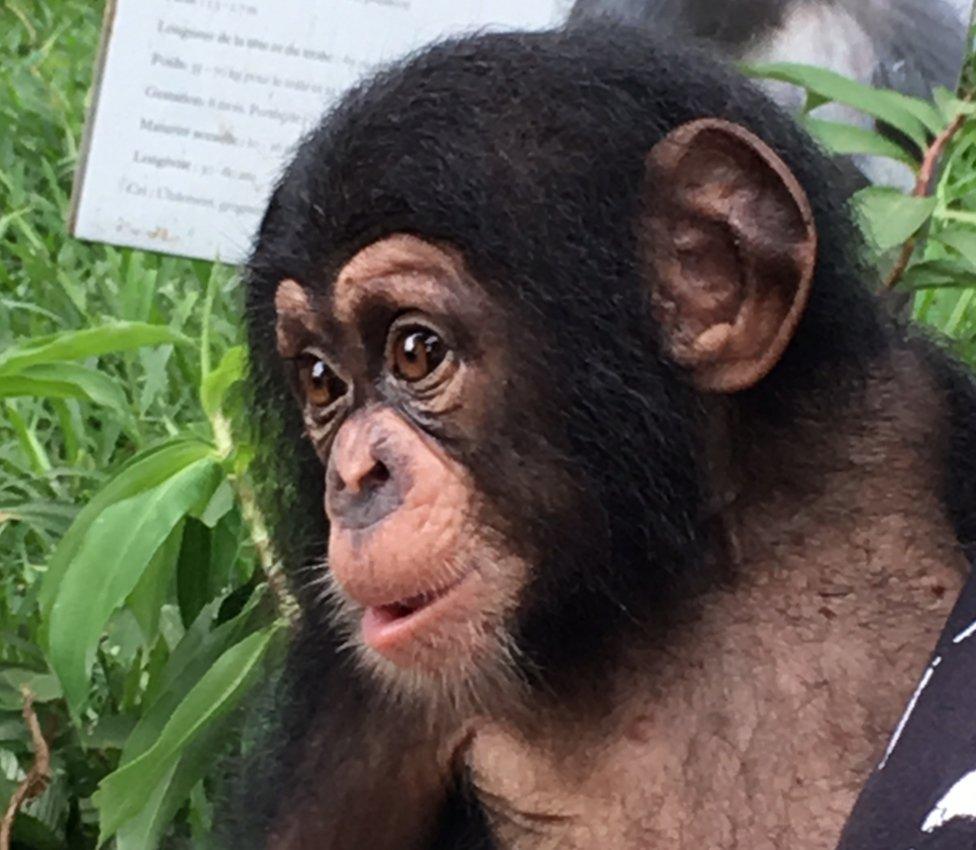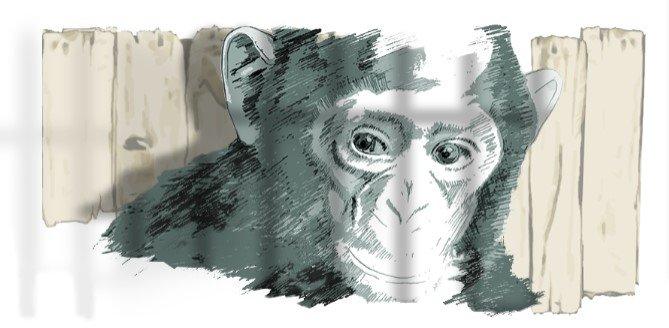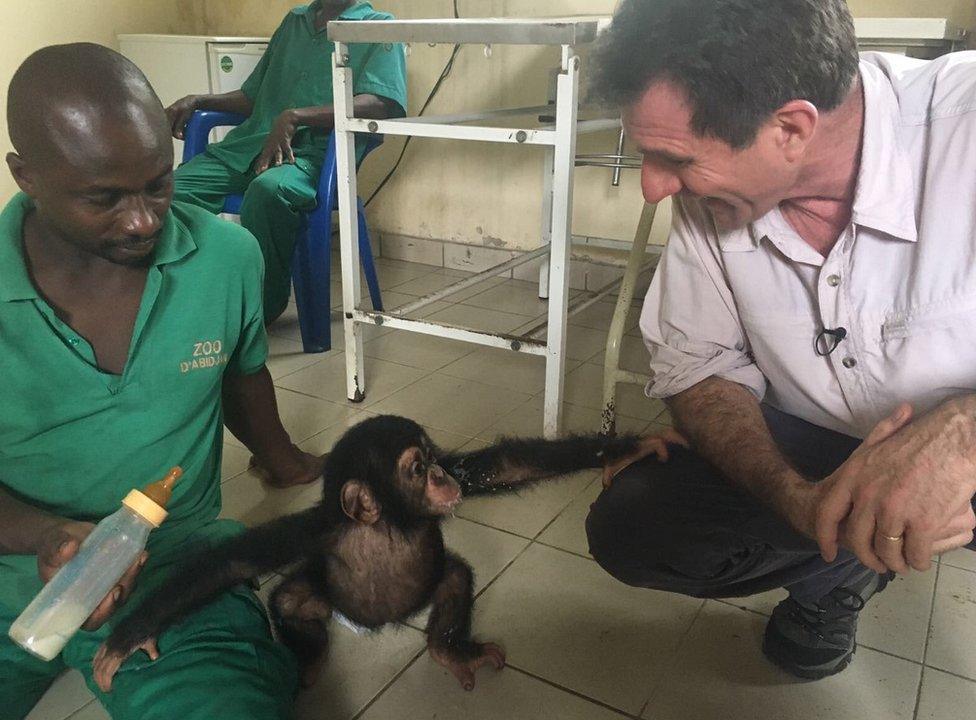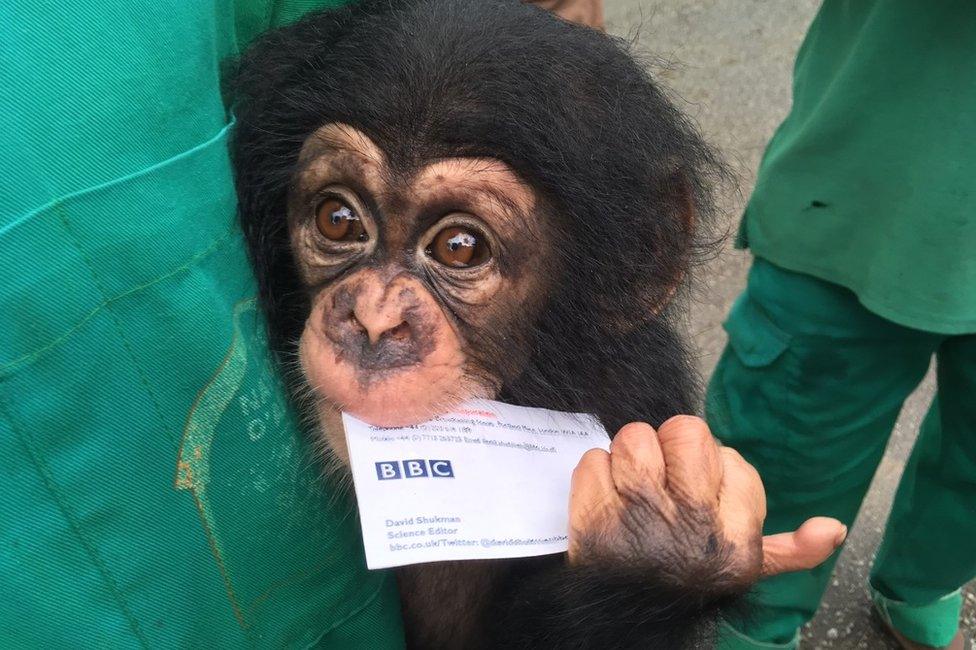Arrests 'big step' in chimp trade battle
- Published

This baby chimp, Nemley junior, was rescued in a police operation in Abidjan
A series of dramatic arrests of notorious wildlife traffickers is being hailed as "one big step" against the illegal trade in baby chimpanzees.
Last weekend one of the most prolific animal dealers in West Africa was found and detained in Guinea.
Prior to the arrest, he had been on the run for four years.
This followed the arrest last month of the dealer's father who was regarded as the key figure in a vast smuggling network spanning the region.
And only a few months ago a year-long BBC News investigation led to the arrests of two traffickers, Ibrahima Traore and his uncle Mohamed, in neighbouring Ivory Coast.
Videos circulating on the black market showed dozens of baby chimpanzees held in a distinctive blue room that served as their holding centre while buyers were sought.
Chimpanzees as a species are listed as endangered because their populations are dwindling in the face of deforestation and poaching but a collapse in their numbers in West Africa means they are described as "critically endangered" there.
It is against international law to seize or sell the chimpanzees but baby chimps are in big demand as pets for wealthy buyers in the Gulf states and Asia and our investigation revealed a flourishing and secret trade.
Our undercover reporter was offered two of the tiny animals for $12,500 each.


The secret trade in baby chimps
A secret network of wildlife traffickers selling baby chimpanzees was exposed by a year-long BBC News investigation.

The two men arrested in Ivory Coast are known to have links with the pair arrested in Guinea, Abdoul Salam Sidibe and his father Abdouramane, who have been accused of shipping hundreds of endangered animals including chimpanzees.
One of the investigators who worked on the case, Mamadou Saidou Barry of the wildlife organisation GALF, working with the Eagle Network, said the Sidibe family operated in five countries and paid as many as 100 poachers to capture chimpanzees.
"This is not the end," he told BBC News, "It is not the final fight but it is one big step, but it is a never-ending battle against wildlife trafficking. "
Guinea has long been regarded as a hotspot for wildlife trafficking and has even been barred from issuing export permits for any shipments of animals under the CITES convention (Convention on International Trading in Endangered Species).
Nearly two years ago, the official in charge of the CITES office in Guinea, Ansoumane Doumbouya, was arrested and later sentenced to 18 months in prison for selling fraudulent export permits to the Traore and Sidibe families, among others.
Last month he was given a presidential pardon and is now out of prison.
The head of the CITES secretariat, John Scanlon, told us that he believes that law enforcement can act as a deterrent.
"Once you arrest them, you prosecute them, you incarcerate them, that message starts to get out , that wildlife crime is not high profit-low risk. The risk is I might go to jail."
Mr Scanlon also confirmed that since our investigation, in which we had managed to buy two fraudulent export permits, warnings had been circulated worldwide to look out for potentially forged documents from Jordan and Liberia.

Nemley Jr meets David Shukman
The permits sold to us were apparently issued by those two countries though the governments of both have denied that the documents were genuine.
In terms of quantity, the illegal trade in chimpanzees is dwarfed by the slaughter of elephants for their tusks or rhinos for their horns.
But capturing a live baby chimpanzee in the jungle involves shooting its mother and many other members of its family as well - up to ten adults are estimated to be killed for each infant chimp seized alive.
The prosecution of the Traores in Ivory Coast is the first ever brought for wildlife trafficking in the country and campaigners say it is evidence of a shift in official attitudes towards the fight against the traffickers.
Dople Claude Soro, chief of staff of the Ministry of Water and Forests, says describes the cae as "important'.
"Those who did these illicit operations - those operations were forbidden and we can see them as a crime. Those people are to be punished."

You might also like to read:

The new focus on wildlife crime is seen as potentially offering a chance to turn the tide on the traffickers though with plenty of risks ahead.
The UK's Africa minister, Tobias Ellwood, visiting Ivory Coast, told me that one key requirement was to improve safeguards for wildlife.
"We are seeing a recognition that more needs to be done but this is a massive problem - many of the places like national parks where these animals are to be protected simply don't have the protection."
Estelle Raballand, an expert in chimpanzees, is hoping to win support for the country to set up its first sanctuary for chimpanzees.
She says that if the Ivorian government has decided to make wildlife trafficking a priority, then it follows that there needs to be capacity to care for the confiscated animals.
"You cannot apply the law unless you have a place to put the chimps, "she says. .
And although she is pleased at the recent wave of arrests, she warns that time is running out.
"We're fighting a war of extinction…if we don't do anything and the rate is continuing, pretty much everyone agrees that in 10 years there will be no more wild chimpanzees in West Africa. And that's terrible."

A baby chimp rescued - David Shukman

Nemley Junior chews a BBC business card
Since the first reports of our investigation into chimpanzee trafficking just over a month ago, many people have asked about the fate of the baby chimp, Nemley junior, who was rescued in a police operation in Abidjan.
At the time, he was thin and nervous and soon suffered a heavy cold. But with expert support he recovered and has since been putting on weight and becoming more active with brighter eyes and an engaging curiosity.
I watched him guzzling a bottle of infant formula and then clambering over the supports of a trestle table before amusing himself by gently slapping my knee.
He has formed a bond with his keepers, especially one called Charles Aby, who has learned how Nemley junior clamours to be held as much as possible, a natural response for an infant who would normally be with his mother for five years.
So Charles goes about his duties at Abidjan zoo with Nemley clinging to his side.
And the tiny chimp is becoming bolder. As I handed out my BBC business cards at the zoo, Nemley reached for one and promptly started to chew it. At the moment, he's thriving, a survivor of the traffickers and a new icon of the fight against them.
Follow David on Twitter., external